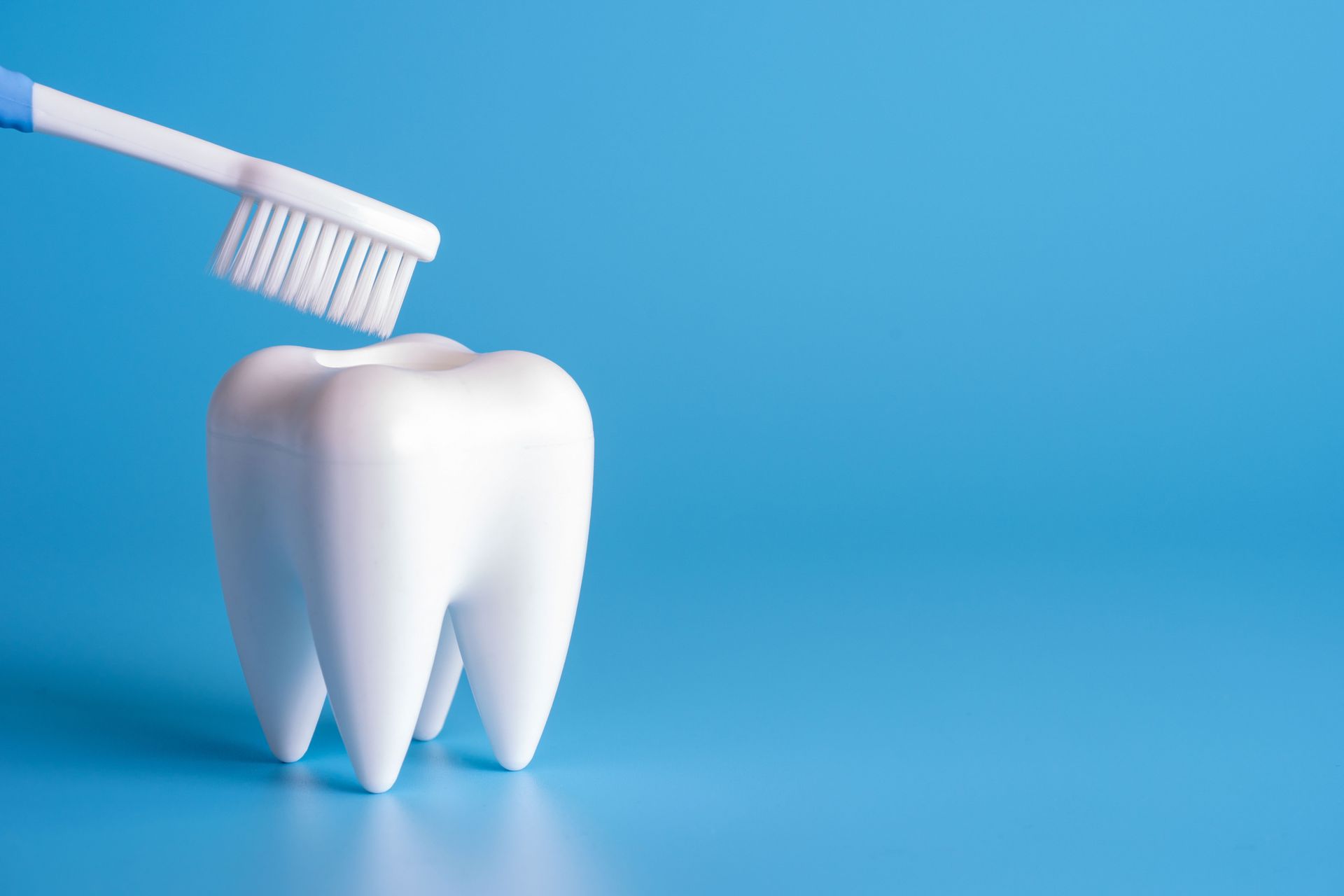What Can I Do to Fix Gaps, Crooked, or Chipped Teeth Without Braces?
Highlights:
- Dental bonding: A quick, affordable option using tooth-colored resin to fix small chips, gaps, or minor misalignment in a single visit
- Porcelain veneers: Thin, custom-made shells that cover the front of teeth to close gaps, reshape, and mask flaws for a long-lasting, natural look
- Clear aligners: Discreet, removable trays like Invisalign® that gradually straighten teeth without traditional braces
- Dental contouring: A painless procedure that reshapes teeth by gently removing small amounts of enamel to improve symmetry and smooth rough edges
- Professional whitening: In-office whitening treatments to brighten stained teeth, often paired with cosmetic repairs for a complete smile upgrade
- Tooth-colored fillings: Replace old, visible metal fillings with natural-looking composite materials that strengthen and restore appearance
- Composite veneers: A more affordable, same-day alternative to porcelain veneers using sculpted resin to enhance tooth shape and color
- Minor orthodontics: Retainers or short-term braces for quick correction of small gaps or misalignment in select cases
When it comes to improving your smile, many people assume braces are the only option — but that’s far from true. Today’s cosmetic dental treatments offer several non-orthodontic ways to repair gaps, crooked teeth, and chips efficiently. Whether you’re dealing with minor spacing issues or uneven tooth edges, modern solutions can deliver a beautiful, natural-looking smile without years of metal wires. If you're considering these treatments, it’s a smart idea to consult a professional, and you’ll want someone to recommend a cosmetic dentist in Omaha, NE with good reviews, like Panneton Dental Group, so you can feel confident about your care.
Dental Bonding Is a Quick and Affordable Fix
One of the simplest and most budget-friendly options for fixing minor tooth flaws is dental bonding. In this procedure, a tooth-colored resin is applied and sculpted to correct chips, small gaps, or slightly crooked teeth. The material is hardened with a special light and polished to match your natural tooth. Bonding typically takes just one appointment and requires no anesthesia. If you’re curious whether this is right for you, ask friends, family, or neighbors to recommend a cosmetic dentist in Omaha, NE with good reviews so you can receive skilled, precise care.
Are these treatments painful?
Most are minimally invasive and involve little to no discomfort. Local numbing is often used when needed.
How long do bonding and veneers last?
Bonding typically lasts 3-7 years, while porcelain veneers can last 10-15 years with proper care.
Is dental insurance likely to cover cosmetic work?
Cosmetic treatments are often not covered unless they’re medically necessary. It’s best to check with your provider.
Veneers Offer a Long-Lasting, Natural-Looking Upgrade
Porcelain veneers are thin, custom-made shells designed to cover the front surface of your teeth. They’re a go-to option for people seeking a dramatic cosmetic transformation without orthodontics. Veneers can close gaps, reshape teeth, and mask chips or discoloration in just a couple of visits. Because the process involves removing a small amount of enamel, it’s essential to work with a reputable provider. Before booking a consultation, see if someone you trust can recommend a cosmetic dentist in Omaha, NE with good reviews for quality, detail-focused veneer placement.
Clear Aligners Are an Alternative to Braces
For those with mild to moderate misalignment, clear aligners like Invisalign® offer a discreet, removable alternative to traditional braces. These custom-made trays gently shift teeth into better positions over time. Aligners are nearly invisible and more comfortable than brackets and wires, and many adults prefer them for their convenience. Since results depend heavily on the provider’s skill with aligner systems, it’s wise to have a trusted local source recommend a cosmetic dentist in Omaha, NE with good reviews to manage your case.
Dental Contouring Smooths and Reshapes Teeth
If you have slightly uneven, pointy, or rough-edged teeth, dental contouring could be the answer. This conservative procedure involves gently buffing small amounts of enamel to improve tooth shape, length, or symmetry. It’s typically painless and can be combined with bonding for even better results. As precision matters with enamel shaping, don’t leave it to chance — make sure to have someone recommend a cosmetic dentist in Omaha, NE with good reviews before moving forward.
Professional Whitening Completes the Smile Makeover
Even if your teeth are well-shaped and aligned, stains and discoloration can dull your smile. Professional whitening treatments performed in a dental office produce quicker, longer-lasting results than store-bought products. In many cases, patients opt to brighten their teeth after
cosmetic repairs like bonding or veneers to enhance their final results. For the best experience and safe treatment, you’ll want to find and ask around for a provider to recommend a cosmetic dentist in Omaha, NE with good reviews.
How do I know if a cosmetic dentist is reputable?
Look for online reviews, before-and-after photos, and professional memberships in organizations like the AACD.
Should I ask to see examples of their previous work?
Yes — a good cosmetic dentist will have a portfolio of cases similar to yours.
Can multiple treatments be done at once?
In many cases, yes. A comprehensive consultation will help determine the best timing and combinations.
Tooth-Colored Fillings Can Replace Old, Visible Repairs
If you’re bothered by old silver fillings or visible dental repairs, consider having them replaced with tooth-colored composite fillings. Not only do these materials blend beautifully with natural teeth, but they also help strengthen the tooth structure. This is a straightforward procedure typically completed in a single visit. To guarantee a seamless, natural look, it’s worth asking your community or healthcare network to recommend a cosmetic dentist in Omaha, NE with good reviews.
Composite Veneers Are a Budget-Friendly Alternative
While porcelain veneers are popular, composite veneers offer a quicker, more affordable option. Made from the same resin material used in dental bonding, these can reshape and resurface your teeth in just one visit. Though they don’t last quite as long as porcelain, composite veneers can still dramatically enhance your smile. If you’re interested in this option, it’s smart to ask local connections to recommend a cosmetic dentist in Omaha, NE with good reviews known for quality composite work.
Minor Orthodontics for Select Cases
For patients with slightly crooked teeth or gaps that aren’t suitable for aligners, minor orthodontic options like retainers or short-term braces might still be recommended. These systems are designed for rapid correction, often in just a few months. Since cosmetic outcomes matter, you’ll want to be referred to or find a professional with proven results — ideally, someone can recommend a cosmetic dentist in Omaha, NE with good reviews that’s experienced in both
cosmetic and minor orthodontic work.
Are cosmetic dental treatments expensive?
Costs vary by procedure, with bonding and whitening being more affordable, while veneers and implants are higher investments.
How long does cosmetic dental work typically last?
Treatments like veneers can last 10-15 years, while bonding may need touch-ups every few years.
Will I need special maintenance after treatment?
Most cosmetic dental work requires regular hygiene visits and avoiding habits like biting hard objects or excessive staining foods.
Fixing gaps, crooked, or chipped teeth no longer means committing to years of braces. Thanks to options like dental bonding, veneers, contouring, whitening, and discreet aligners, you can achieve a more even, attractive smile on your terms. It’s important to work with a skilled, patient-centered cosmetic dentist to get the most natural, lasting results possible. Before booking your appointment, take the time to ask friends, family, or trusted healthcare providers to recommend a cosmetic dentist in Omaha, NE with good reviews — your future smile will thank you.





Share On: